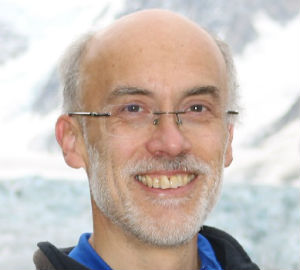University professor joins list of distinguished scientists thanks to world-leading climate research
Release Date 05 May 2017

A professor at the University of Reading has joined an exclusive list of world-leading scientists after he was elected as a Fellow of the Royal Society (FRS).
Professor Jonathan Gregory on Friday joined the likes of Professor Stephen Hawking and Dame Jocelyn Bell Burnell, and several other outstanding scientists at the University of Reading, as an FRS.
Professor Gregory said: “I am surprised and honoured by my election. This is a recognition of the value to society of the climate science which I've been fortunate to have the opportunity to contribute to, with the collaboration and support of many people over many years, in the working environments offered by the Department of Meteorology at the University of Reading, the National Centre for Atmospheric Sciences and the Met Office Hadley Centre.”
The Royal Society, the world's oldest scientific academy in continuous existence, has been at the forefront of enquiry and discovery since its foundation in 1660. New Fellows, from the UK, Republic of Ireland and the Commonwealth, are elected through a peer review process that culminates in a vote by existing Fellows. The main criterion for election as a Fellow is scientific excellence.
Complex climate simulations
Following a first degree in physics at the University of Oxford and a PhD in experimental particle physics at Birmingham, Jonathan changed his area of research because of scientific interest in and personal concern about climate change caused by human activities. He joined the newly formed Met Office Hadley Centre in 1990 and became a professor at the University of Reading in 2006, three years after joining the climate division of the National Centre for Atmospheric Science (NCAS), based in the Department of Meteorology, while also remaining a Research Fellow at the Met Office Hadley Centre.
Professor Gregory uses complex computer simulations of the climate system and combines this with observational evidence to understand how much the planet will warm due to human activities. He also researched the extent to which the sea level is projected to rise due to ocean warming and circulation change, as well as through loss of ice on land in the form of glaciers and ice-sheets.
He has made substantial and world leading contributions as lead author to three crucial assessment reports of the Intergovernmental Panel on Climate Change. These have provided policymakers with expert assessments of the scientific basis of climate change, its impacts and future risks, and informed policy options.
Professor Gregory is one of the leaders of the World Climate Research Programme's Grand Challenge on sea-level change and he received the FitzRoy prize of the Royal Meteorological Society in 2016 for world-leading work on sea-level rise and climate change.
“Science is a great triumph of human achievement and has contributed hugely to the prosperity and health of our world" - Venki Ramakrishnan, President of the Royal Society
Professor Gregory was one of 50 scientists elected as Fellows, with 10 elected as new Foreign Members. See the full list on the Royal Society website.
Venki Ramakrishnan, President of the Royal Society, said: “Science is a great triumph of human achievement and has contributed hugely to the prosperity and health of our world. In the coming decades it will play an increasingly crucial role in tackling the great challenges of our time including food, energy, health and the environment.
“The new Fellows of the Royal Society have already contributed much to science and it gives me great pleasure to welcome them into our ranks.”
Fellows of the Royal Society are elected for life and are designated by the letters FRS after their names. Current Fellows include, Richard Dawkins, Stephen Hawking, Harry Kroto, Tim Berners Lee, Paul Nurse and John Sulston. Previous Fellows include Isaac Newton, Christopher Wren, Charles Darwin, Ernest Rutherford and Dorothy Hodgkin.